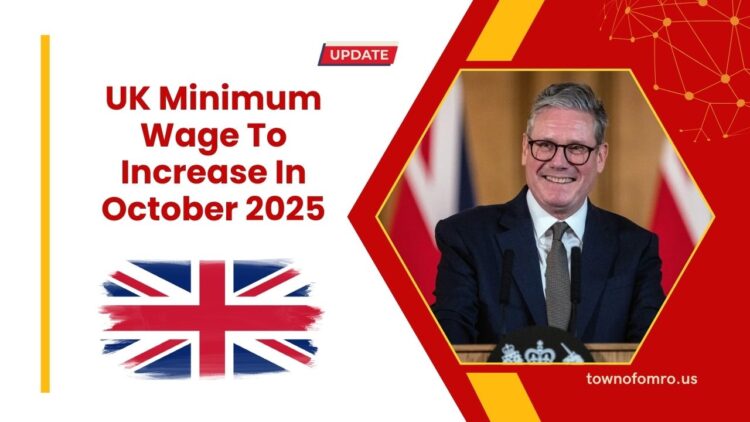The UK minimum wage is set to remain one of the most important topics for workers, apprentices, and employers alike. Starting from October 2025, employees will continue to benefit from the new minimum wage structure that was introduced earlier in the year, bringing higher earnings for millions across the country.
The UK Minimum Wage is a vital part of ensuring fair pay for workers across the country. Every year, the government reviews and updates the rates to match the rising cost of living, protect vulnerable groups like apprentices and young workers, and ensure that businesses pay fairly.
From October 2025, the latest updated rates continue to apply, offering higher wages for millions of employees.
This guide explains the exact rates by age and worker category, how much you could earn annually, the rules around apprenticeships and accommodation, and what both workers and employers need to know about compliance.
This article explains in detail the current minimum wage rates, how much workers in different age groups and categories will receive, the impact on apprentices, and what this means for households and businesses.
Why the UK Minimum Wage Matters
The minimum wage is the lowest amount per hour that employers can legally pay workers. It is designed to ensure that employees earn a fair wage that reflects the rising cost of living. Every year, the government reviews the wage levels and makes adjustments to keep up with inflation, cost-of-living pressures, and economic growth.
The October 2025 update confirms that the latest rates will continue to apply across all age groups and categories, ensuring stability for both workers and employers.
UK Minimum Wage Rates from October 2025
The following rates apply from October 2025 onwards:
| Worker Category | Hourly Rate (£) | Weekly Pay (37.5 hrs) | Monthly Pay (Approx.) | Yearly Pay (Approx.) |
|---|---|---|---|---|
| 21 and Over (National Living Wage) | £12.21 | £457.88 | £1,984 | £23,809 |
| Ages 18–20 | £10.00 | £375.00 | £1,625 | £19,500 |
| Under 18 | £7.55 | £283.13 | £1,227 | £14,723 |
| Apprentices | £7.55 | £283.13 | £1,227 | £14,723 |
Key Highlights of the October 2025 Minimum Wage
- National Living Wage (21+) at £12.21/hour
- Full-time workers (37.5 hours/week) earn nearly £23,800 annually.
- 18–20 year olds see significant boosts
- Their hourly pay is now £10.00/hour, closing the gap with the NLW.
- Young workers under 18
- Still earn £7.55/hour, a strong rise compared to past years.
- Apprentices
- Apprentices under 19, or over 19 in their first year, must be paid at least £7.55/hour.
- Once they complete their first year, they qualify for the minimum wage of their age group.
Accommodation Offset
One important detail often missed is the accommodation offset rate. If employers provide housing for workers, only a fixed amount can be counted towards meeting minimum wage requirements.
From October 2025, the rate remains £10.66 per day (or £74.62 per week). Any excess charge for accommodation reduces the worker’s pay when calculating minimum wage compliance.
What This Means for Workers
For employees, the October 2025 rates mean:
- Higher take-home pay compared to 2024.
- Younger workers are catching up with older colleagues in terms of wages.
- Apprentices benefit from better starting rates, giving them fairer compensation while training.
What This Means for Employers
Employers must:
- Ensure they pay the correct minimum wage based on age and apprenticeship status.
- Adjust payroll systems when workers turn 18, 21, or complete their first apprenticeship year.
- Review any accommodation charges in line with the offset rule.
- Stay compliant, as failure to pay the legal minimum can result in heavy fines and public naming.
Impact on the Economy
The October 2025 continuation of these rates is expected to:
- Put more money into the pockets of low-income households, helping with rising living costs.
- Increase business costs, especially in retail, hospitality, and care sectors where many workers are paid at or near minimum wage.
- Support overall consumer spending, as higher wages often boost demand in the economy.
Future Outlook – What Happens Next?
While the October 2025 rates remain fixed, the Low Pay Commission will provide recommendations later this year for the April 2026 increase. Workers and employers can expect another review to ensure that pay keeps up with the cost of living and inflation.
The UK minimum wage in October 2025 stays at the new levels set earlier in the year, offering record increases for young people and apprentices and strong protection for 21+ workers. With the National Living Wage at £12.21/hour, millions of workers are seeing improved wages that better reflect modern living costs.
For employers, compliance is non-negotiable—checking age brackets, apprenticeship progress, and accommodation rules is essential. For workers, this rise provides fairer pay, financial stability, and a better quality of life.
The next big update will come in April 2026, but for now, these October 2025 rates mark an important milestone in the UK’s commitment to fair wages.
The October 2025 UK minimum wage rates confirm a strong step forward for workers, with higher pay across all categories and a fairer system for apprentices and young employees.
For those aged 21 and over, the National Living Wage of £12.21/hour offers stability, while younger workers also see significant boosts. Employers must remain compliant by carefully monitoring pay rates, age changes, and accommodation rules.
This increase not only strengthens worker protections but also supports the wider economy through higher household spending power. Looking ahead, the next major change will arrive in April 2026, but for now, October 2025 marks a crucial moment in ensuring fair wages and better living standards for millions in the UK.
FAQs
What is the UK minimum wage for October 2025?
The minimum wage in October 2025 is £12.21/hour for workers aged 21 and over, £10.00/hour for 18–20, and £7.55/hour for under-18s and apprentices.
Does the minimum wage change again in October 2025?
No, the rates set in April 2025 remain valid through October. The next change is expected in April 2026.
How does accommodation affect minimum wage pay?
If an employer provides housing, only £10.66/day (£74.62/week) can be counted toward minimum wage compliance. Any charge above this reduces a worker’s calculated pay.




